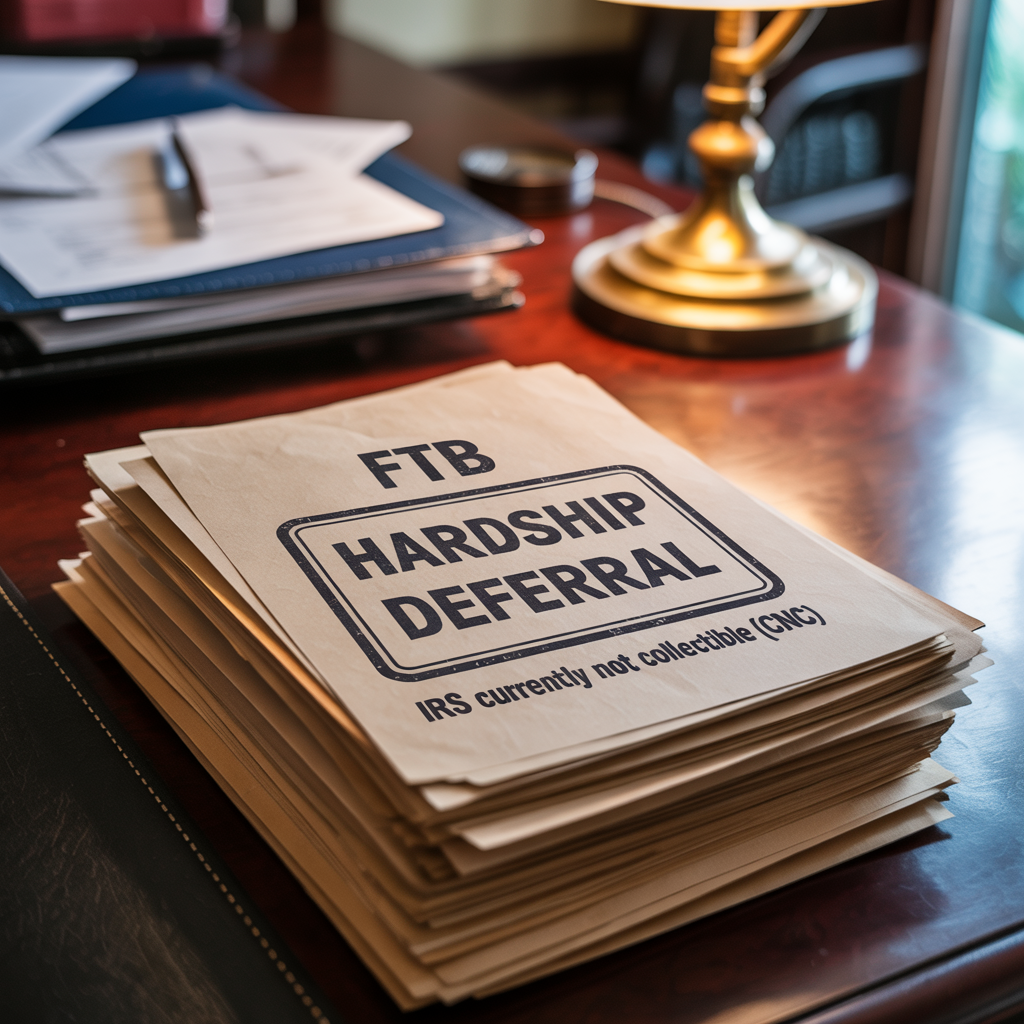FTB Hardship Deferral vs IRS Currently Not Collectible (CNC)

You Can Pause Collections — But Only If You Apply Correctly
If you're facing aggressive tax collections from the IRS or California Franchise Tax Board (FTB) but truly can’t afford to pay, you may qualify for one of two underutilized—but powerful—programs:
- IRS Currently Not Collectible (CNC)
- Apply for FTB hardship deferral
Both stop garnishments and levies—but they’re not equal.
This guide compares both programs and shows Orange County taxpayers how to pause collections legally and safely.
What Is IRS Currently Not Collectible (CNC)?
CNC means the IRS acknowledges your inability to pay and temporarily halts enforcement.
- No garnishments
- No levies
- No required monthly payments
- Interest/penalties continue
- Reviewed annually
Requires full financial disclosure using IRS Form 433-A or 433-F, and is an important step if you want to learn more about the CNC program before applying.
What Is California FTB Hardship Deferral?
California’s version of CNC, but less structured and more difficult to secure.
- Stops levies/garnishments temporarily
- Requires hardship documentation
- May require a hardship letter or CPA submission
- Can be shorter in duration than IRS CNC
- Reviewed less predictably
👉 Understand how hardship determinations are made so you can prepare your documentation effectively and avoid delays.
Side-by-Side Comparison
| Feature | IRS CNC | FTB HArdship Deferral |
|---|---|---|
| Stops Collections | ✅ Yes | ✅ Yes |
| Payments Required | ❌ No | ❌ No |
| Interest Accrues | ✅ Yes | ✅ Yes |
| Annual Review | ✅ Yes | ❌ Not always |
| Process | Formal via Form 433-A/F | Less formal, more variable |
| Easier to Get? | Moderate | Harder |
Who Qualifies?
- Income barely covers living expenses
- No significant assets
- May be elderly, disabled, medically impacted, or unemployed
- In compliance with filings
Documents You’ll Need
- Income proof (paystubs, Social Security, etc.)
- Expense breakdowns (rent, medical, car, food)
- Asset listings
- For FTB: Hardship letter, supporting bank statements
- For IRS: IRS Form 433-A or 433-F
What Happens Next?
- If approved, collections stop
- The debt remains
- You must maintain compliance (file returns, avoid new debt)
- If financial situation improves, collections may resume
It’s also possible to reduce penalties while in hardship or CNC status if you can show the IRS or FTB that your inability to pay was due to circumstances beyond your control.
How Boulanger CPA Helps
We help clients in Anaheim, Santa Ana, Irvine, Fullerton, and across Orange County:
- Apply for FTB or IRS hardship relief
- Stop wage garnishments and bank levies
- File back tax returns
- Transition from hardship to settlement (Offer in Compromise)
📞 Call
657-218-5700
🌐
www.orangecounty.cpa
Frequently Asked Questions
What is FTB hardship deferral?
FTB hardship deferral allows eligible California taxpayers to temporarily stop enforced collection due to financial hardship, while still owing the debt.
What is IRS Currently Not Collectible status?
Currently Not Collectible (CNC) status stops IRS collection activity when you can’t afford to make payments without causing financial hardship.
How long do hardship or CNC statuses last?
Both are temporary. The FTB or IRS may review your financial situation periodically to determine if you can begin making payments.
Does interest still accrue?
Yes. Even while collections are paused, interest and some penalties continue to accrue on your tax debt.
Which program is easier to qualify for?
Qualification depends on your specific circumstances, but both require detailed financial documentation to prove hardship.
Can a CPA help me apply?
Yes. A CPA can prepare your financial statements, submit the application, and negotiate with the FTB or IRS to secure relief.
📣 About the Author
Marc Boulanger, CPA is the founder of Boulanger CPA and Consulting PC, a boutique tax resolution firm based in Orange County, California and trusted by high-income individuals and business owners across Southern California.
He is the author of Defend What’s Yours: A California Taxpayer’s Guide to Beating the IRS and FTB at Their Own Game, available now on Amazon. The book offers a step-by-step plan for resolving IRS and FTB tax debt without losing your business, your home, or your peace of mind.
With over a decade of experience resolving high-stakes IRS and State tax matters, Marc brings strategic insight to complex cases involving wage garnishments, bank levies, unfiled returns, and six-figure tax debts. He is known for helping clients reduce or eliminate tax liabilities through expertly negotiated settlements and compliance plans.
Marc is a Certified Public Accountant licensed in California and Oklahoma and holds the designation of Certified Tax Representation Consultant. He is a member of the American Society of Tax Problem Solvers (ASTPS) — the national organization founded by the educators and practitioners who have trained thousands of CPAs, EAs, and tax attorneys in IRS representation strategy.
Every case is handled with discretion, proven methodology, and direct CPA-led representation — not call center scripts.
📍 Learn more at www.orangecounty.cpa or call (657) 218-5700.










